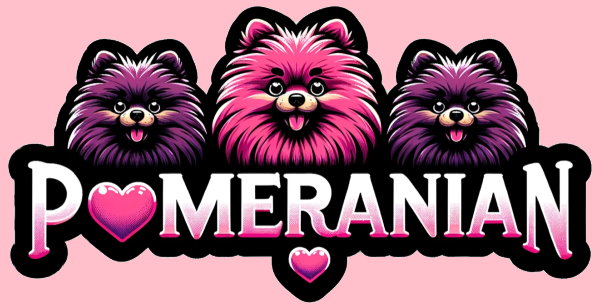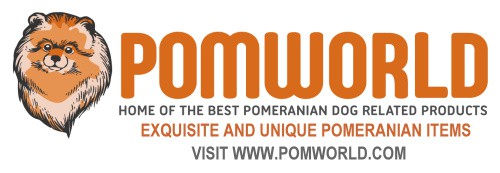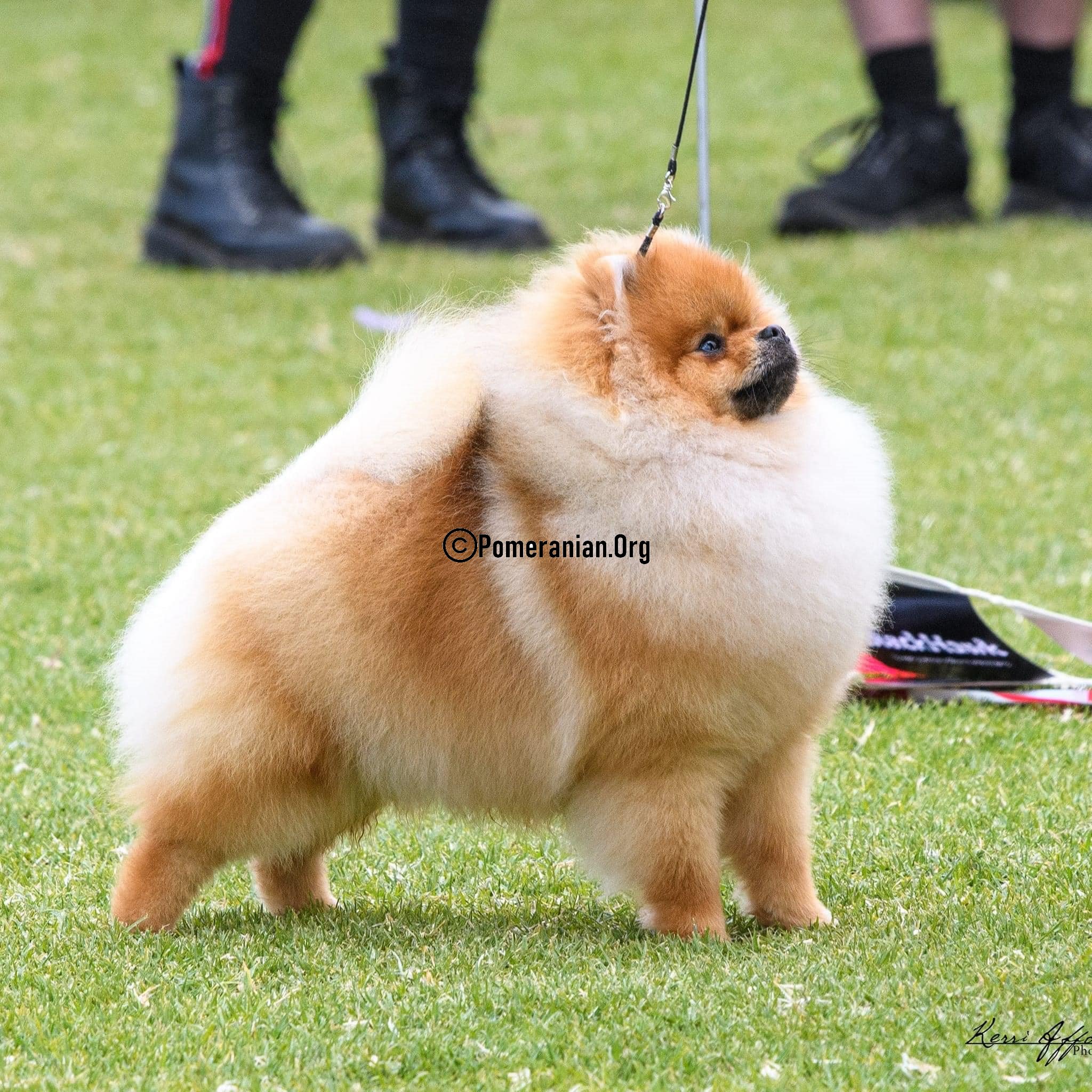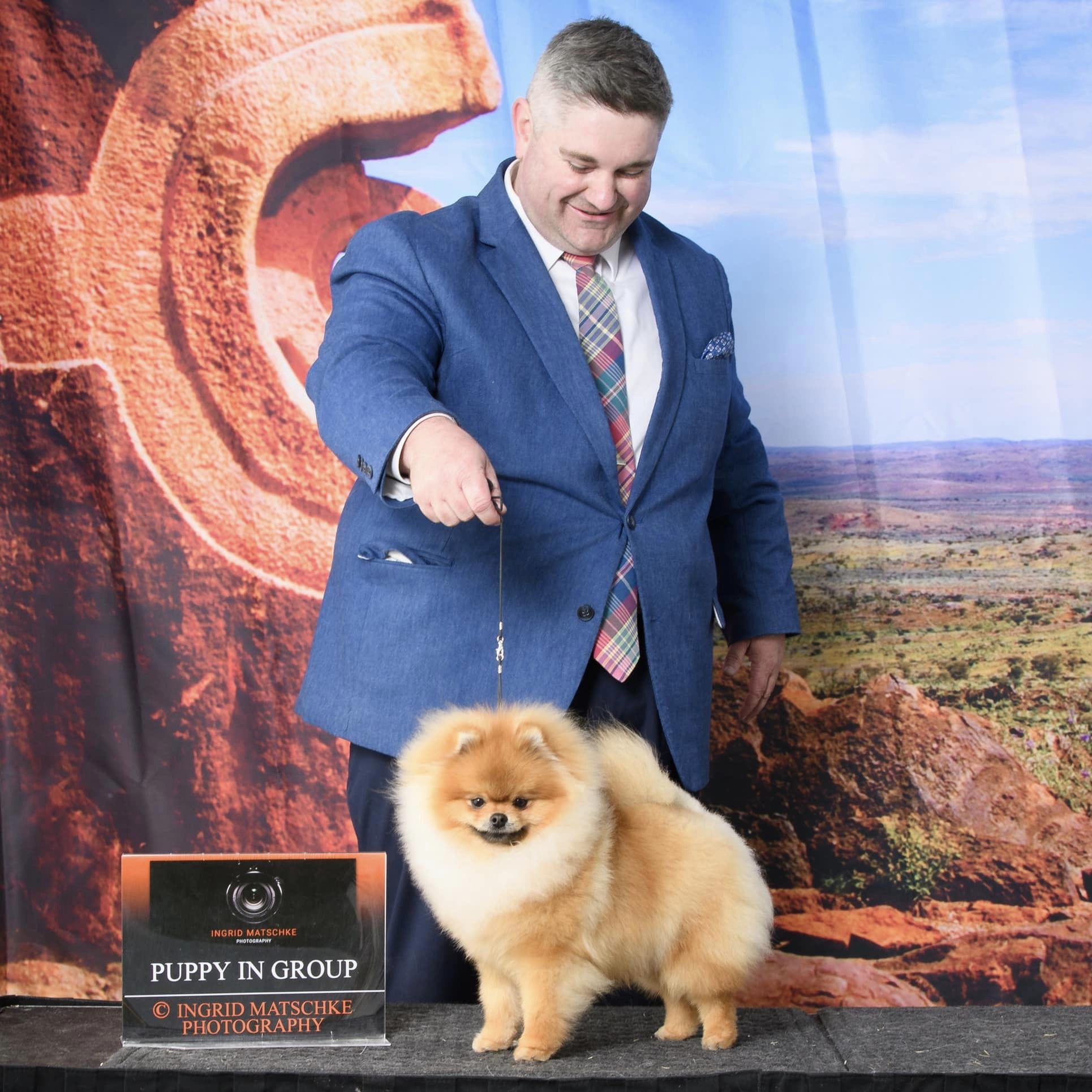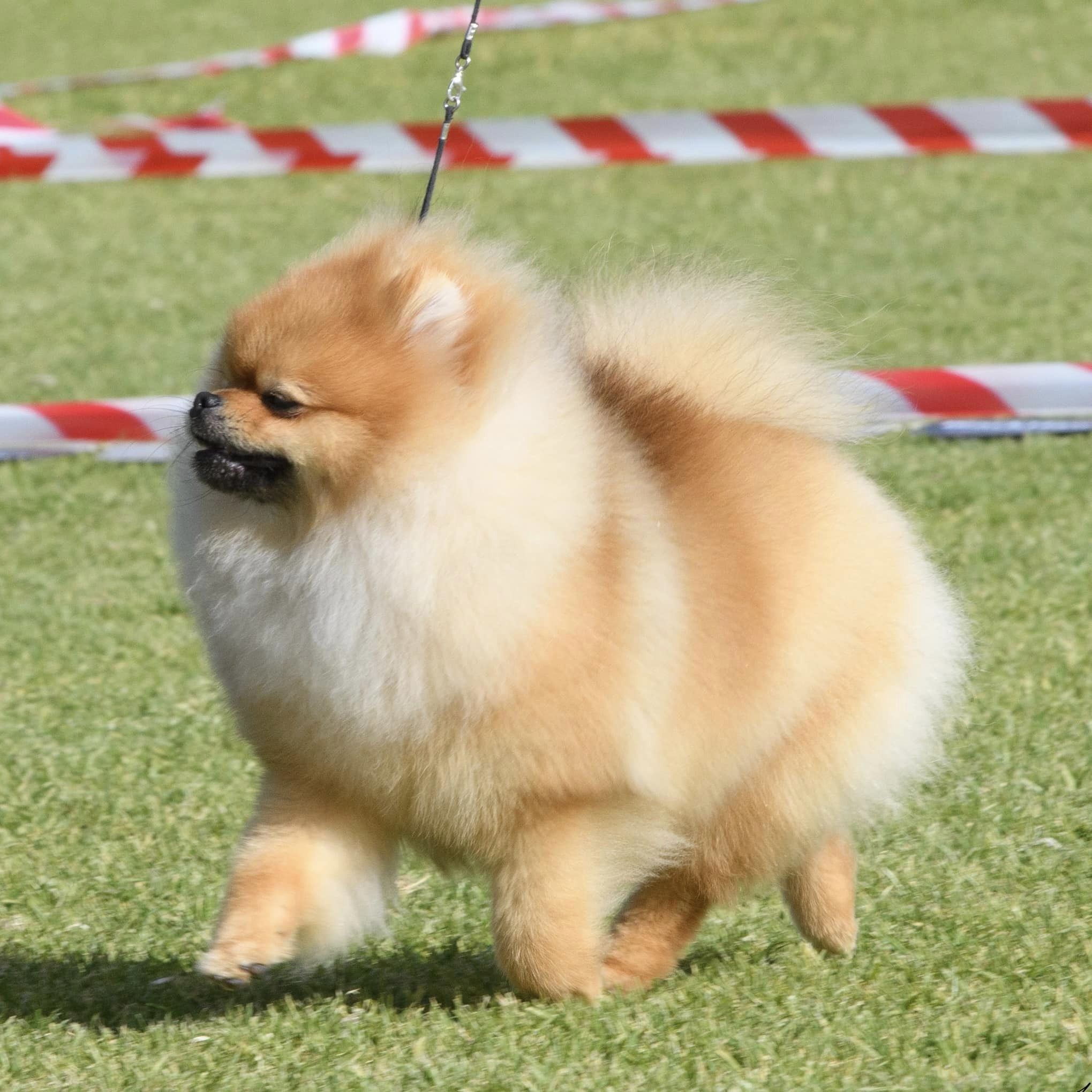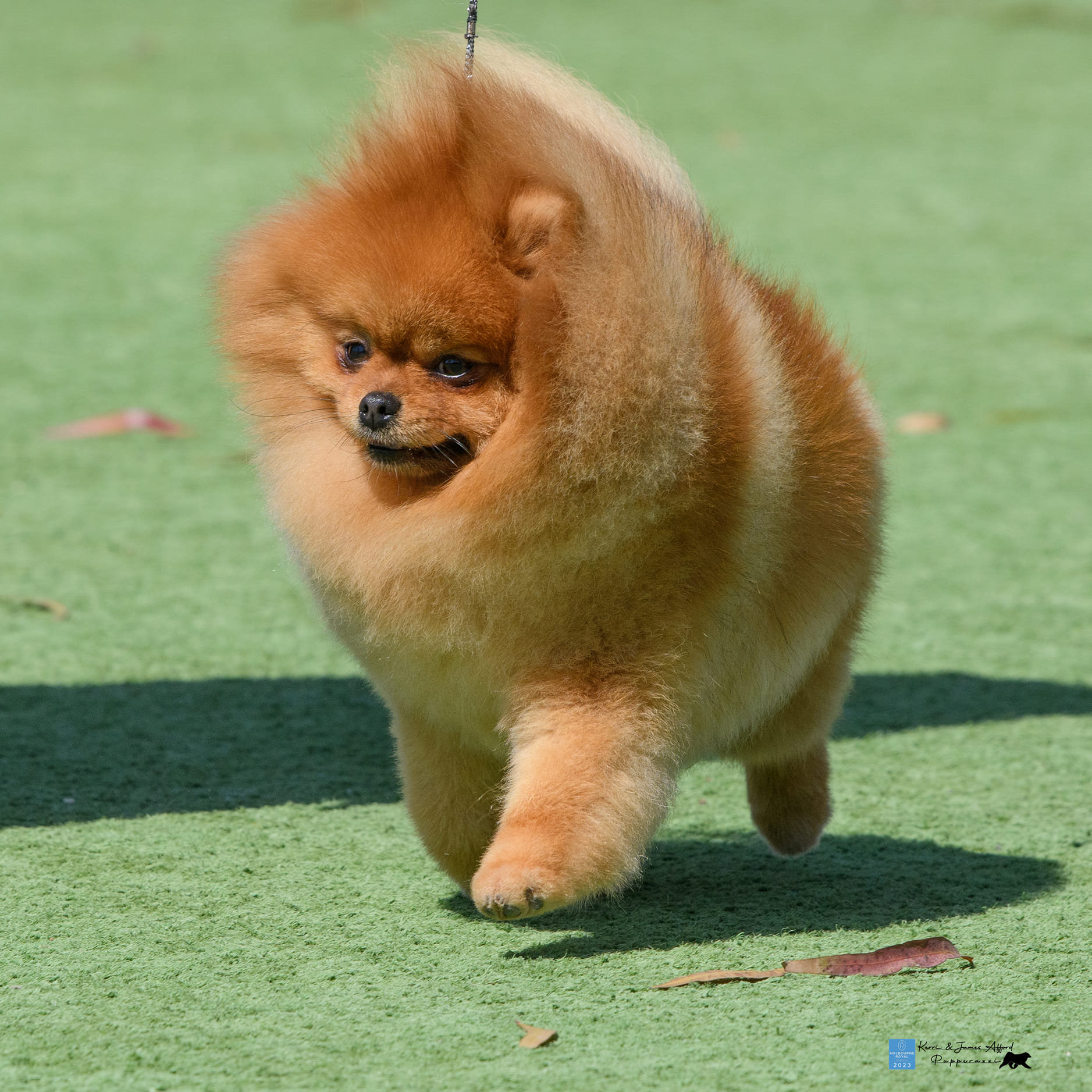Last Updated on 09/02/2024 by Dochlaggie. Post first published on January 5, 2020.
Newborn Pomeranian puppies are often quite fragile and often require skilled Pomeranian baby puppy care. However, skilled puppy care from birth will help improve the chances of baby Pomeranians surviving.
As a champion Pomeranian breeder for many decades, I would like to share my knowledge of
how to care for newborn puppies and their mother.
Purchase Necessary Pomeranian Whelping Supplies
Ensure you have the necessary Pomeranian whelping supplies well before your Female’s due date.
Move the mother to the place where she will whelp at least 10 days prior to birth. This helps her relax and become comfortable in that space. This is also helpful if she happens to give birth earlier than anticipated, because she’ll already be relaxed in her environment.
Each mum must also have her own space for whelping so she doesn’t get over-excited and bark at other dogs from a distance or other pets.
If this does happen, she should have her space in a different room to all other pets. If not, she can get distracted and may step on a newborn Pomeranian puppy or simply neglect her litter because her focus is elsewhere.
Groom and Bath Your Female Pomeranian Prior to Whelping
Before your female Pomeranian is ready for whelping, brush her body thoroughly but gently to get rid of any loose hair that may get into a newborn Pomeranian puppy’s mouth and cause either choking or an impact on the intestines.
Shave her stomach a few days beforehand so the Pomeranian baby puppies can easily get to her teats to suck on. Trim long hair to avoid puppies getting tangled.
Chart the Mother-to-Be’s Temperature
For a few days before birth, take her temperature each morning and evening (using a digital rectal thermometer is the best way to do it). Once she drops below 99 degrees, she will be close to giving birth. Then you must monitor her closely to ensure no problems occur prior to, or during, the whelping period.
Pomeranian Whelping Box
Within her enclosure, she needs a whelping box that she can jump into or out of but that can’t let puppies crawl out of it. A cardboard box is ideal. Simply cut the front down to only six inches. Use two of the top flaps to create a panel for the base of the box.
Tape the flaps together with packing or duct tape, and slightly overlap the pieces so it fits perfectly into the bottom. You may decide to cut a single piece a little smaller than the box and user that instead. Wrap that panel with a baby blanket or soft towel before placing it inside the box.
This provides a soft, absorbent surface that puppies can’t get tangled in or get trapped beneath, as
newborn puppies suffocate under blankets.
Consider saving the panel to put in the box after whelping so it doesn’t get soiled while the whelping is occurring. You may choose to place two big towels instead and then remove them after puppies are born and put the panel in place then.
If the mum digs aggressively at the towel wrapping and makes it come loose, consider taping the towel to the box bottom. Another option is to use a flannel pillow case. Put a small wash cloth in the box for mum to nest with but small enough so baby Pomeranian puppies can’t get rolled in it.
Wash the bedding when it’s soiled. Once the baby Pomeranian puppies are three weeks old, you can cut the front panel down a bit so they can crawl in and out of the box if they desire.
Watching Room and Whelping Box Temperature Creates the Best Newborn Puppy Environment
A popular saying among breeders is – “a chilled puppy is a dead puppy.” Keeping puppies warm after birth is extremely important. Ensure the puppies are on a light heat for the first few weeks.
What Room Temperature For Newborn Puppies?
- Week One:29-32 Celsius or 85-90 Fahrenheit.
- Week Two: slowly drop the room temperature to 26-29 Celsius ( 80-85 Fahrenheit).
- Week Three: 23-26 Celsius ( 75- 80 Fahrenheit).
- Week Four: 21-23 Celsius ( 70- 85 Fahrenheit).
How to Keep Newborn Puppies Warm
A heating blanket or pad set on very low is ideal method of keeping newborn puppies warm. Place the cord so it can’t be chewed on.
As the Pomeranian baby puppies grow older, decrease the heat more because they’ll be able to maintain healthy body heat on their own.
If the baby Pomeranians are winter pups or are kept in a room with air conditioning, it’s wise to have a light source of heat until they’re eight weeks old. Over time, you must get them used to cooler temperatures so they don’t get sick when the cold weather hits.
If any of the Pomeranian baby puppies have lung problems or their breathing is quite raspy, run an essential oil diffuser (with a breathing blend) and a humidifier.
Ensure Your Pomeranian Mother Gets Sufficient Fluids and is Eating Well
While she’s nursing, half a cup of goat’s milk each day is a good idea. If the mum doesn’t drink enough, she can’t produce ample milk for all her pups.
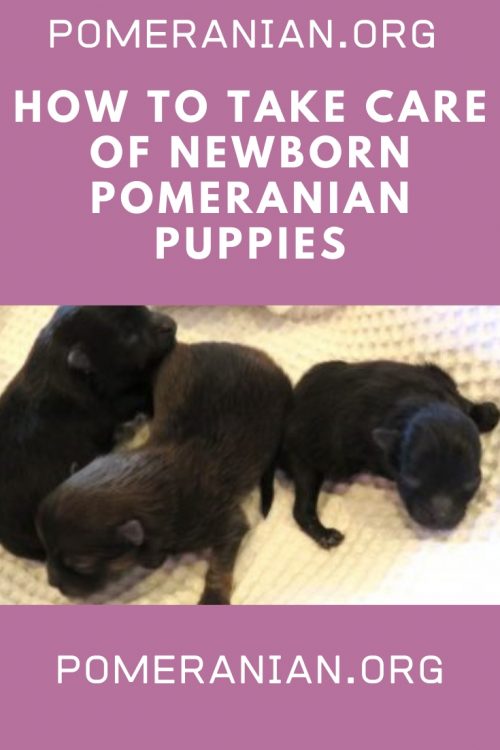
Ensure your Pomeranian Mother is eating enough food to provide for herself and her new family.
To prevent Eclampsia (Milk Fever) your Pom Mother must eat a well balanced, high quality puppy food during pregnancy and lactation.
How Often Should You Weigh Newborn Puppies?
Weigh each Pomeranian puppy daily to ensure they’re gaining weight. Despite handling puppies after birth is not the best practice, it’s wise to buy a 5-pound digital postage scale that can show readings to the tenth of an ounce so you’ll know exactly how much weight is being added to your puppies.
A small drop in weight is natural after birth but if it drops after day one, your Pomeranian puppies will need supplements because there’s something not right.
Mother’s milk is the ideal newborn puppy milk supplement. However, this isn’t always possible. There are lots of formulas you can try.
Goat’s milk or a formula that is based on goat’s milk is the best. If you can get fresh goat’s milk, keep some in the freezer for emergency supplementing newborn puppies. If you can only get the formula, keep that in your fridge.
How Soon Should Puppies Nurse After Birth?
Newborn puppies should commence feeding from their Mom immediately after birth.
Pomeranian newborn puppy care often involves bottle or tube feeding. Learn tube feeding form a breeder or your vet. Always hold the puppy on a teat after the feeding because the sucking stimulates his digestive system. Pups who don’t suck rarely live long.
How Often Do Newborn Puppies Poop?
Newborn Pomeranian puppies can’t eliminate by themselves. If the mother isn’t regularly cleaning newborn puppies, you’ll have to diaper them after each feeding time.
“Diapering” just means wiping their genital area with a cotton ball or moist cloth until they do eliminate. Human baby wipes are great for this task.
Pups need to open their bowels within the first 24 hours. Newborn Pomeranian pups often require lots of assistance with this.
If a mum has either low weight or premature Pomeranian pups, give her some Red Raspberry Leaf (in tea or a tincture) mixed together with goat’s milk every day while she’s pregnant.
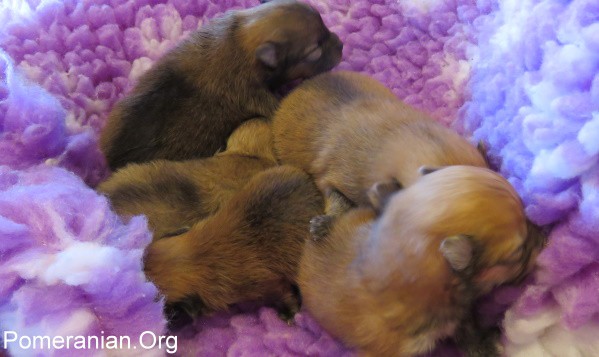
When Should Puppies Be Vet Checked?
If all is going well with the Mother dog and her puppies, I don’t like to disturb and will have the puppies vet checked and vaccinated at 6 weeks.
When to Feed Newborn Puppies Solid Food?
Pomeranian puppies can be started on solid puppy food at around 3 weeks of age.
Final Thoughts On How to Take Care of Newborn Pomeranian Puppies
Taking care of newborn puppies can be a very rewarding as well as a very tiring task.
Disclaimer: The Content is not intended to be a substitute for professional veterinarian advice, diagnosis, or treatment. Always seek the advice of your veterinarian with any questions you may have regarding the medical condition of your dog. Never disregard professional advice or delay in seeking it because of something you have read on ANY website.
Copyright Pomeranian.org. All Rights Reserved.
References and Further Reading:
[1] Denise Leo “The Pomeranian Handbook”.
